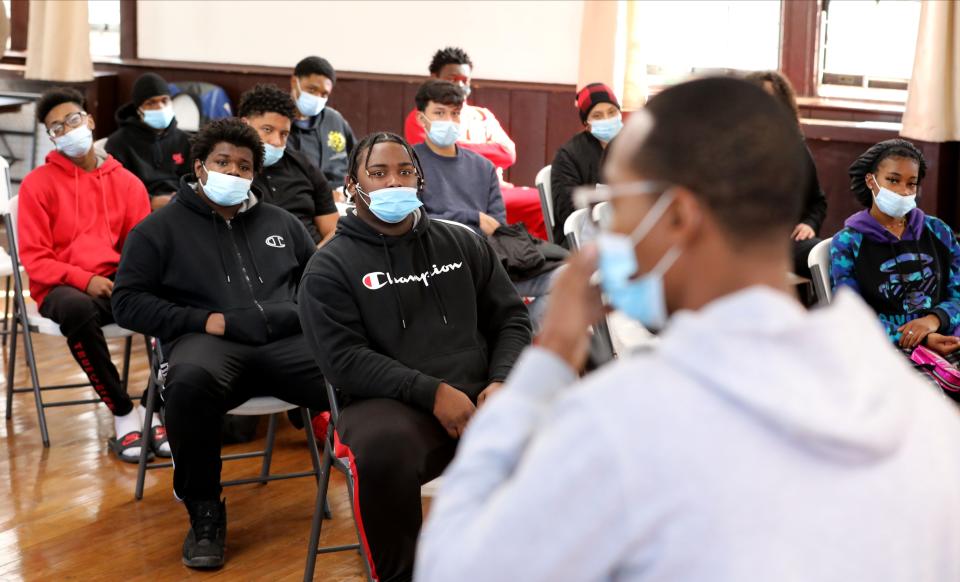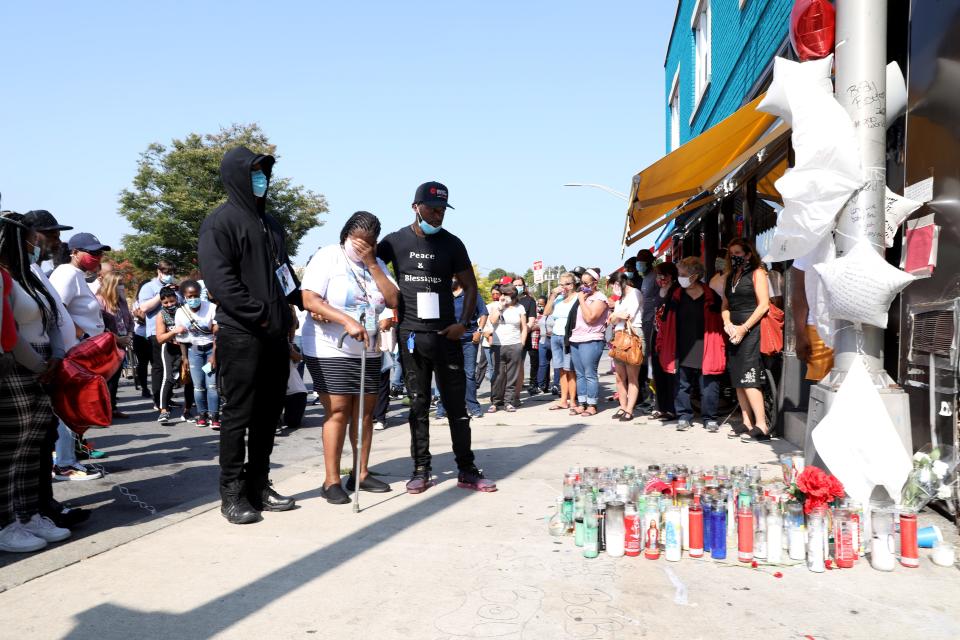Groups want $1B for community violence programs, other services to combat gun violence
- Oops!Something went wrong.Please try again later.
Amid an uptick in gun violence during the pandemic, several groups say it's time to invest $1 billion into community violence programs and other victim and survivor services.
In a letter to Gov. Kathy Hochul and other legislative leaders, 100 groups across New York asked for community solutions to deal with the increase as residents, politicians and law enforcement search for a remedy for the violence.
The letter's signers hope the additional funds can be used to bolster existing community violence programs, while also allowing for the creation of new reputable initiatives.
“It’s imperative that we get these funds to groups that are currently operating successfully right now, but we also need to ensure that there is a process for the development and funding of new programs because many cities and other areas have no programming at all for either community-based gun violence intervention or survivor services,” said Nick Encalada-Malinowski of VOCAL-NY, one of the organizations that signed the letter.
From 2019 to 2020, fatal shootings in New York have risen by nearly 80%, state officials said.
The western New York city of Rochester saw 81 killings last year, marking a 56% increase from 2020, analysis by the Center for Public Safety Initiatives at the Rochester Institute of Technology has found.
RELATED: Gun violence on the minds of New York residents as President Biden comes to town
RELATED: 'Despair drives all kinds of evil,' including Rochester's murder rate. What can be done?
The letter was also sent to state Senate Majority Leader Andrea Stewart-Cousin and Assembly Speaker Carl Heastie, who did not respond to a request for comment Thursday.
In a response to the letter, Stewart-Cousin touted gun violence legislation and the 2009 implementation of the street outreach program SNUG across New York, and its expansion under her leadership.
Still, the Yonkers Democrat said, “Our work isn’t done,” and "we will take input like this to build upon that progress and continue to fight for smart investments to keep our communities safe."
Touted by President Joe Biden in his recent visit to the state, community violence intervention programs are a public health approach to reducing shootings and killings through establishing a relationship with people at the center of gun violence in neighborhoods, according to the Vera Institute of Justice.
Some programs involve hospital-based violence interruption, where case managers and social service providers support survivors and prevent retaliation, the institute said. Other approaches employ trained credible messengers to reach out to people at the center of gun violence through pacifist solutions, including de-escalation and mediation.
Cure Violence Global, an intervention program in several cities across the country, has found promising results. Areas in New York City, Chicago, and Baltimore that have implemented the initiative have seen a reduction of shootings and killings by more than 30%, according to a study by the group that was cited by the institute.
Meanwhile, other studies have produced mixed results.

Hochul said she would like to set aside $224 million for gun violence prevention programs in her budget.
The budget triples the investment to community-based gun violence response program SNUG with a nearly $25 million investment, according to the state of the state book. Some of that proposed funding will be used to expand the SNUG program to Niagara Falls, Utica and Schenectady, areas that have seen an uptick in shootings.
Hochul also plans to expand hospital-based community gun violence specialists from the state’s eight trauma centers to all 22, according to her State of the State address last month. She is pushing for greater recruitment and retainment of outreach workers, as well as scaling up community-based violence prevention.
Hochul also plans to push to recruit and retain outreach workers and deal with the challenges in scaling the community-based violence prevention efforts.
But the groups who signed the letter remained concerned that the additional funding will not be enough to deal with the violence. Hochul’s office did not respond to comment on the letter.

David Caba is vice president of Bronx Rises Against Gun Violence at Good Shepherd Services. From the streets to the schools and hospitals, Caba and his team of credible messengers — violence interrupters who have themselves experienced violence — work to curb gun violence in a hot spot zone in the western part of the borough.
“There are places that the credible messenger can go and things they can do and people they can talk to (that) there no other profession can,” he said Wednesday.
He added: “We can go to trap houses. We can go to a dice game. We can go where weapons are."
Caba said his team of anti-violence workers has found success in curbing shootings, but that bringing the program to scale in more neighborhoods is proving to be difficult because of the lack of funding.
With the $1 billion, he hopes to expand the program and support the frontline workers who deal with the profession's mental and physical toll.
Moreover, Caba hopes the funds will help mobilize communities that witness gun violence for decades to reject the violence.
Tiffany Cusaac-Smith covers race and justice for the USA TODAY Network of New York. Click here for her latest stories. Follow her on Twitter @T_Cusaac.
This article originally appeared on New York State Team: Groups want s $1B for community violence programs, other services

